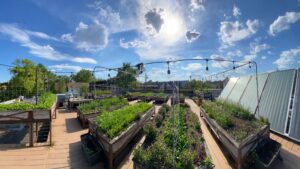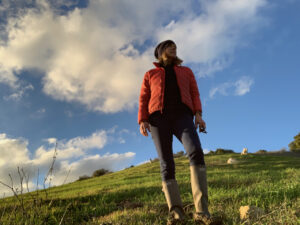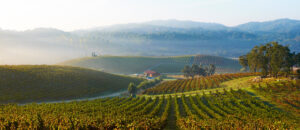
Uncommon Ground — America’s First Certified Organic Rooftop Farm
Founded by Helen and Mike Cameron, Uncommon Ground is America’s first certified organic rooftop farm.
USA
Onalee Duane August 2, 2021
Bruce Cakebread, of Cakebread Cellars, tells his family story behind the Cakebread wine name and how the passion for winemaking and the outdoors has passed from one generation to the next. The company provides visitors to the vineyards with unique experiences, such as sustainability-focused pairing and tasting experiences. Cakebread’s Napa Valley wineries look to continue to set an example for sustainable vineyard practices, making it their priority to embrace environmental responsibility and protect and enhance the land for the winemakers to come.
Mood of Living: Where did you go to school? What did you study?
BC: I attended UC Davis for Viticulture and Enology from 1976 to 1978. Before that I attended Cal Poly SLO to study Pomology.
MoL: When did you know that you wanted to go into the family business?
BC: I have always had a passion for agriculture and the outdoors. Wine interest followed while working with my father at the winery in the late ’70s. We were only making a few barrels at the time — everything was hands on, each day a new challenge.
MoL: How did your father’s passion for photography lead him to Napa Valley? Who did your father study photography under?
BC: My father likes to say that he followed a circuitous route to the vineyards. He originally worked with my grandfather’s car repair business in Oakland and pursued freelance photography on the side. He studied under Ansel Adams from 1957 to 1966. In 1972, he was hired to come to Napa Valley to help photograph what would become Nathan Chroman’s celebrated coffee table book, The Treasury of American Wines.
MoL: What inspired your father to buy the 22-acre ranch? How did your parents grow such a successful business from scratch? Did they have prior experience with farming?
BC: My father used the $2,500 advance from that book as a down payment on a family friend’s ranch in Rutherford. This is the site of Cakebread Cellars today. In addition to car repair and photography, my father was no stranger to farming — he’d previously worked on my grandfather’s Contra Costa County ranch, growing almonds, peaches, apricots and walnuts. In the early days, my dad continued working at Cakebread’s Garage in Oakland while he and my mother, Dolores, planted and tended to grapes at the winery on evenings and weekends.
MoL: When did your parents found Cakebread Cellars? What was the first wine produced? How has your winery expanded over the years, and what wine varieties do you produce today?
BC: Cakebread Cellars was founded after that fateful visit to Rutherford. The first wine produced was a 1973 Chardonnay at just 157 cases total. Our first vintage of Cabernet Sauvignon was 1974 and Sauvignon Blanc in 1976. In the nearly 50 years since, the winery has expanded to plant additional vineyards in Napa Valley as well as Anderson Valley in Mendocino County for our Pinot Noir.
MoL: Cakebread Cellars became Green Certified in 2008. The company also received the California Green Medal Award for its commitment to sustainability, the Bee Friendly certification for the organic garden and The Suscol Mountain Vineyard was certified as fish friendly in 2018. Can you tell us more about your sustainable vineyard practices at the wineries and what is involved in becoming certified?
BC: Quality and sustainability have been integral to Cakebread Cellars since our first vintage in 1973. As a family winery, it is part of our culture, and we want to protect and enhance the lands for future generations. One way we embrace environmental responsibility is with our Green practices that range from sustainable vineyard practices, organic farming and diligent water and energy conservation to extensive recycling operations. In fact, Cakebread Cellars was the second California winery to achieve Napa Green certification!
MoL: What experience do you provide your visitors?
BC: In 2019, we opened the doors of our state-of-the-art, eco-friendly Visitors Center at the winery. We offer a variety of elevated experiences, from walking tours to culinary pairings to sustainability-focused tastings. We want to immerse our guests in the experience of winemaking. We think it’s fun and educational to see how our wines are made and then be able to enjoy them at the winery in beautiful surroundings with gracious hospitality. Our tasting room is open daily, by appointment only.
MoL: How has Cakebread Cellars collaborated with chefs and food purveyors from around the country over the years? How does good food and wine connect people?
BC: Cuisine has always been at the heart of Cakebread Cellars. Since its inception, our culinary program has been inspired by the seasonal bounty of our estate fruit and vegetable garden beginning with our American Harvest Workshop that we put on for over 30 years. Our resident chefs continue that tradition by pairing farm-to-table fare with our acclaimed wines for vintner dinners, private events and cooking classes at our Napa winery. We believe that wine and food are intrinsically linked, so our chef team at the winery regularly post delicious wine-pairing recipes on our website to be enjoyed with friends and family, even if you are not in Napa.
MoL: Has Cakebread Cellars experienced any setbacks due to environmental change over the years and if so, how did the company overcome them? How has climate change impacted the winery? How do you see protecting your vineyards in the future?
BC: We have experienced the range of challenges over the years — earthquakes, fires and droughts. What has helped us through all these challenges is our people. We are fortunate that our employees are focused on watching out for each other when a disaster hits, as well as making sure the wines are taken care of during the difficult times. When we have had earthquakes or fires, our culinary team made sure everyone was well-fed since some employees’ houses were impacted.
In regard to climate change and the vineyards, we are looking at ways to adapt to changing conditions in our current vineyards. For example, we are using shade cloth on the afternoon side of the canopy to reduce heat on the fruit, changing our irrigation practices to adapt to less water, using a mist system within the canopy to increase humidity on very dry hot days and changing our canopy structure to allow for more natural shading of the fruit. For the long term, as we replant vineyards, we are talking with climate experts to understand what type of changes we should be planning and learning lessons from other wine regions around the world like Australia, Israel and Bordeaux. It is a challenging time that forces us to be very creative as we look towards the future.
MoL: Do you lead an eco-conscious lifestyle? If so, how?
BC: Being sustainable is more of a journey than a destination for our business and what we do at home. At our home we have installed PV panels and battery to reduce our use of electricity from our utility supplier and have power during the blackouts. We also use the solar system to charge our electric car. We have changed our home landscape to drought resistant plants to reduce water use. We recently added a beehive to our garden. (Queen Babbitty Bumble is doing fine, if you are wondering!) The bees are enjoying the bee-friendly flowering plants in the garden. I have been increasing our composting to support our veggie gardens, and as a pandemic project, started making Vermicompost and Vermicompost tea for our gardens, the winery veggie gardens, and our vineyard at our home. My wife, Rosemary, has been farming our vineyard certified organic for many years.
MoL: What do you envision for the future of Cakebread?
BC: We have been fortunate to be growing grapes and making wine in Napa Valley for almost 50 years. The lands, the wines and the community in Napa are special. Going forward, we need to build upon the foundation that has been established, making it better for the next generation.
MoL: What advice do you have for aspiring winemakers or entrepreneurs interested in sustainability?
BC: The goal should be to create a bigger impact on what we are doing in our green programs. Sustainability is a shared resource. Offer to share what you have learned on your journey and learn from others. This is why the Napa Green program is an important forum to share and learn new practices. It will take everyone’s efforts and willingness to change in order to impact climate change.
Photography courtesy of Cakebread Cellars.

Founded by Helen and Mike Cameron, Uncommon Ground is America’s first certified organic rooftop farm.

Located outside of Paso Robles, California, Villa Creek Winery prioritizes the cultivation of organic and biodynamic wine.

As a pioneer of California wine, Tablas Creek continues to lead the art of blending Califorinia’s Rhone varietals.